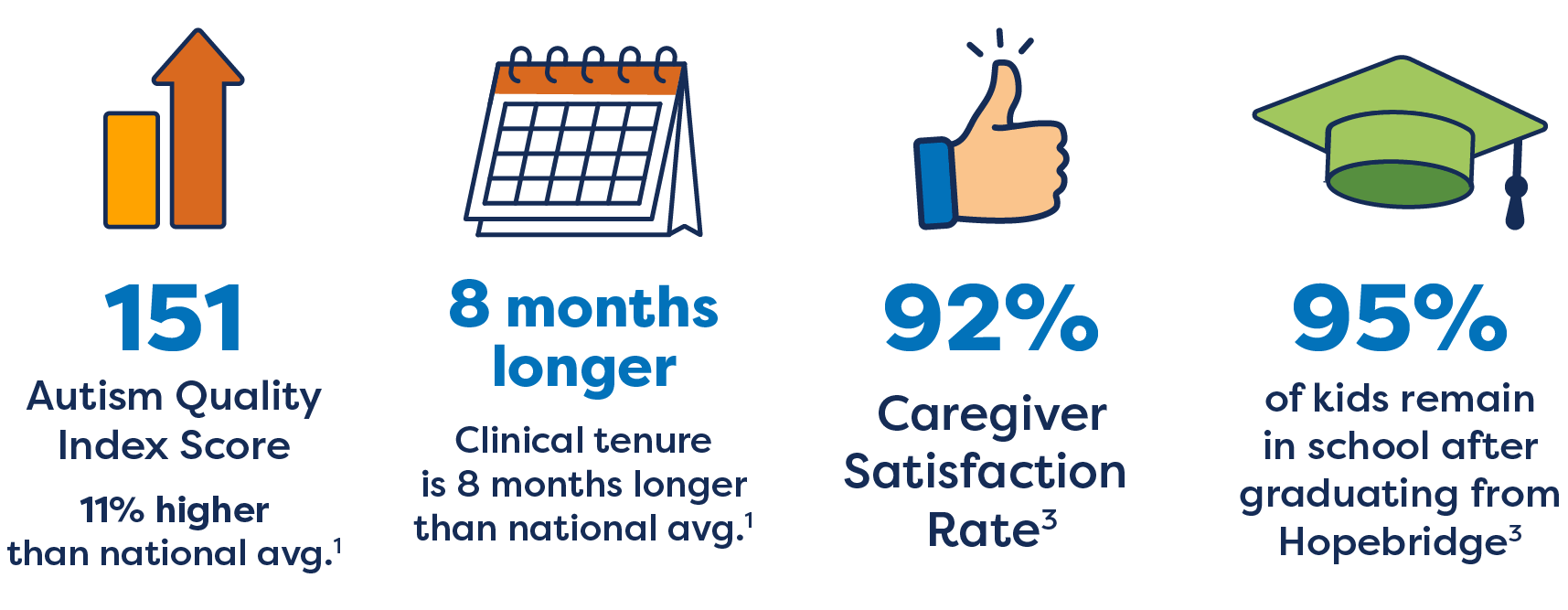
Clinical Outcomes
Advancing clinical quality toward value-based care
As one of the country’s leading providers of pediatric therapy with an ASD Quality Index Score that outperforms the national average, we are in the position to make a positive impact for our patients, our people, our community and our science. Through data-driven services, extensive training opportunities, research initiatives and clinical innovation, we are moving forward in the pursuit of better care for all children and families.

How We're Impacting Clinical Outcomes
Measurement is a key piece of ensuring clinical quality. The Hopebridge Assessment Platform (HAP) set the stage for the way our field analyzes and enhances services. It leverages data collected from millions of hours of applied behavior analysis (ABA), licensed psychology, occupational therapy, physical therapy and speech therapy sessions to drive value-based care and inform clinical quality.
By reviewing patient-reported outcome measures (PROMs), clinician-reported outcome measures (CROMs), and age and norm-referenced assessments all in one place, we interpret a variety of data to paint an objective picture for our families and team. The platform provides insights into patient progress, clinical outcomes and the effectiveness of treatment modalities, as well as helps us continuously measure and improve services.
– Vineland Adaptive Behavior Scales (Vineland-3)
– Verbal Behavior Milestones Assessment and Placement Program (VB-MAPP)
– Child and Family Quality of Life (CFQL-2)
– Behavioral Health Index (BHI)
– Autism Diagnostic Observation Schedule (ADOS-2)
– Sensory Profile (SP-2)
– Goldman-Fristoe Test of Articulation (GFTA-3)
– Peabody Developmental Motor Scale (PDMS-2)
– Preschool Language Scales (PLS-5)
– The Roll Evaluation of Activities of Life (REAL)
– Hopebridge Post-Therapy Transition Survey
– Net Promoter Score (NPS)
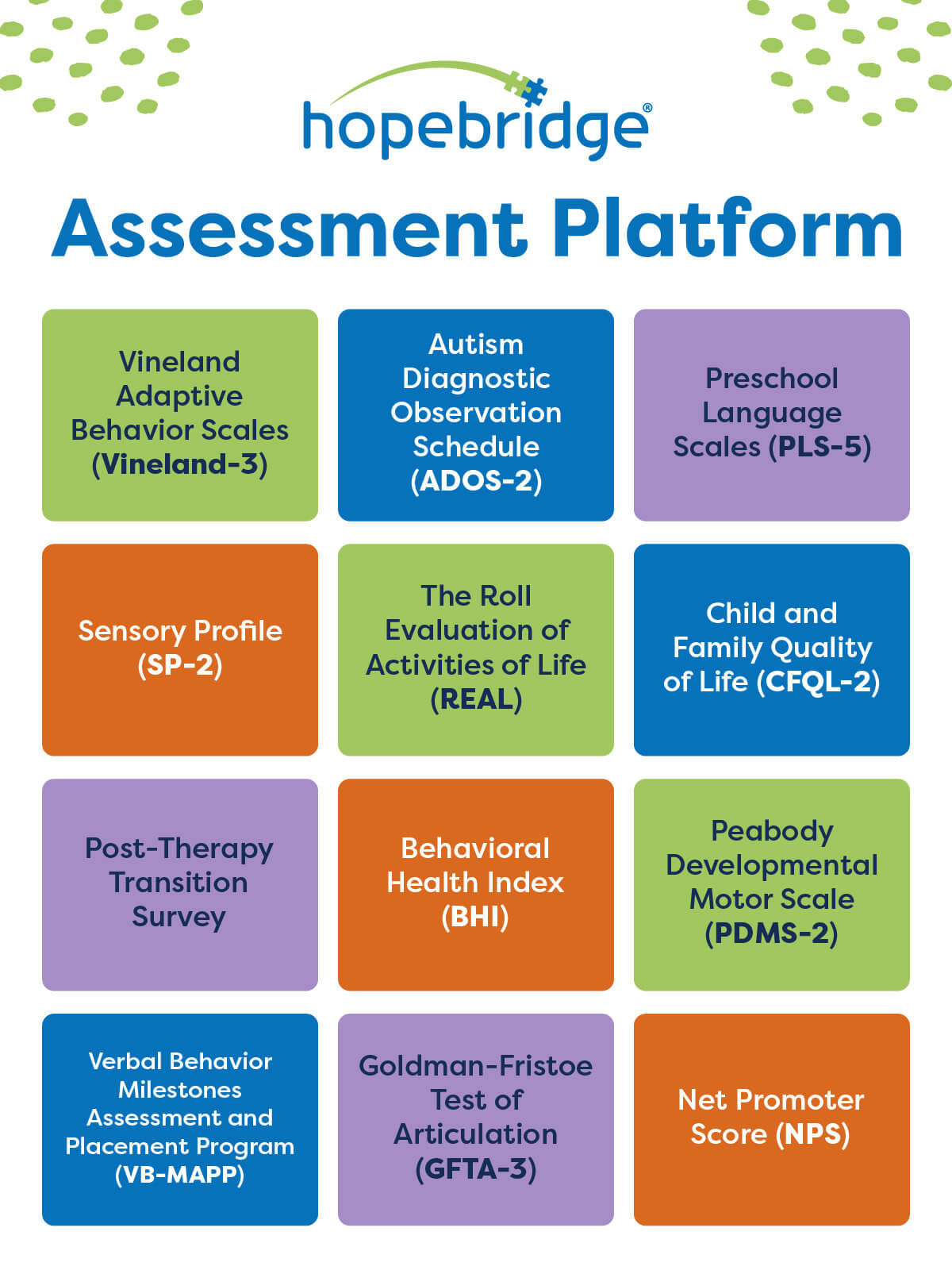
In addition to launching our own robust data system through the Hopebridge Assessment Platform, we also joined other organizations to support the launch of the National Autism Data Registry (NADR). First of its kind, the NADR tracks and reports longitudinal benchmarks on quality of applied behavior analysis (ABA) treatment measures across providers, which transforms the way the field analyzes and enhances services.
Data show an ASD Quality Index Score of 151 for Hopebridge, which is 11% higher than that of the average provider. This puts Hopebridge in the top 1% of providers that contribute to NADR1. To determine the score, NADR takes into consideration age- and norm-referenced assessment scores, family quality of life assessments, timeliness of care and cost of care, among other notable variables that positively influence overall patient and familial outcomes.
Together, these findings highlight Hopebridge’s contributions in the world of pediatric therapy through high-quality care, and our participation with NADR will keep us pushing forward to make an impact on clinical outcomes time and time again.
What’s next? This data and composition of the Quality Index Score is iterative and pulled on a quarterly basis. Hopebridge looks forward to gathering a total outcomes score in the future. If you want to want to stay looped in with the latest updates on NADR, be sure to follow along.
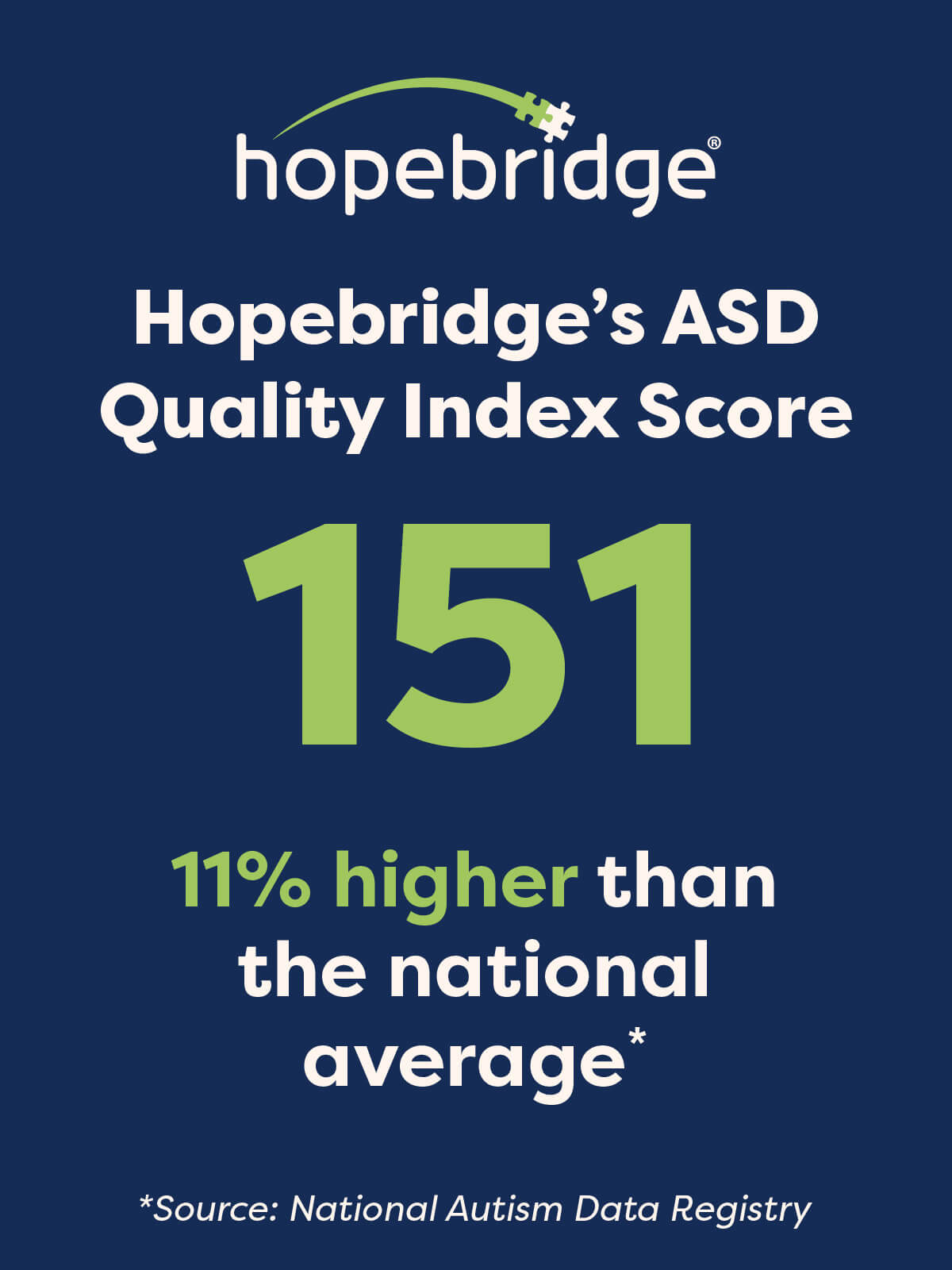
When Hopebridge founder, Kim Strunk, opened her first center, she did so with an ambitious mission. She had the desire to increase access to quality clinical care for underserved populations. Nearly two decades later, Hopebridge works to uphold that mission—ensuring all children have access to high-quality autism care, no matter their background, circumstances or zip code.
At Hopebridge, we believe that services should be accessible for all, and that means lobbying and advocating in all of our states for fair and equitable coverage for all families. Hopebridge is one of the few providers to accept and serve families with Medicaid, in addition to those with commercial insurance.
Research shows an urgent need for increased care in diverse communities2. Black children are 19% less likely to receive a diagnosis of ASD and five times less likely to receive early intervention therapy than white children. Hispanic children are 65% less likely to receive a diagnosis of ASD than white children, and children living in low-income areas are 80% less likely to be identified with autism without intellectual disability than children living in affluent areas.
We stand strong in our mission to affect these numbers, as Hopebridge continues to over-index in providing more affordable services to children and families from unrepresented populations, including:
– African American: 38%
– Hispanic: 28%
– Single-parent families: 14%
– Households with 2-4 children: 21%
– Families at or below poverty line: 28%
One of the ways we are doing this is through appropriate assessment identification. Our Diversity, Equity and Inclusion work group (DE&I) has made concerted efforts to be sensitive to assessment adoption, for example, such as using the CFQL-2 within our resources because its metrics are specifically built with diversity in mind.
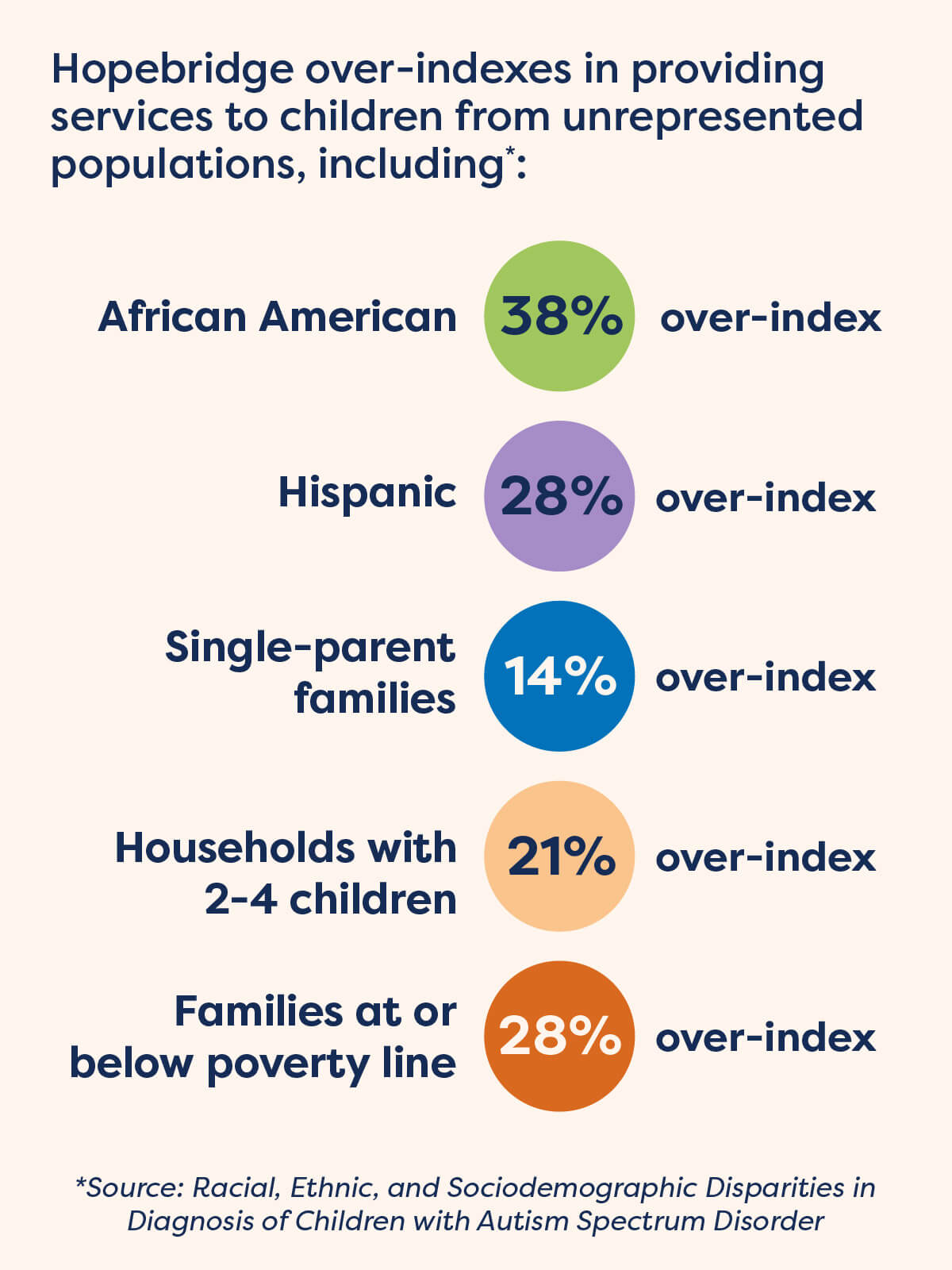
Caregivers know their children best. That’s why the score of 92% in caregiver satisfaction3 for our Hopebridge therapy services is such an impactful outcome for our team, as it exceeds the national healthcare average of 78% satisfaction4.
We are here to lift our children to their greatest potentials, but we strive to support our caregivers, too. Familial well-being is a significant piece of the bigger picture that surrounds our patients’ progress and the push toward more compassionate, child-centered care. By incorporating assessments like the Child and Family Quality of Life-2nd edition (CFQL-2) within our repertoire, we are able to not only craft holistic goals based on caregiver input, but also track and measure the effectiveness of our work as it relates to the entire family. Keeping a close eye on outcomes helps clinicians dive into the ways therapy can help increase joy for the child and family through their interactions with their environment and each other.
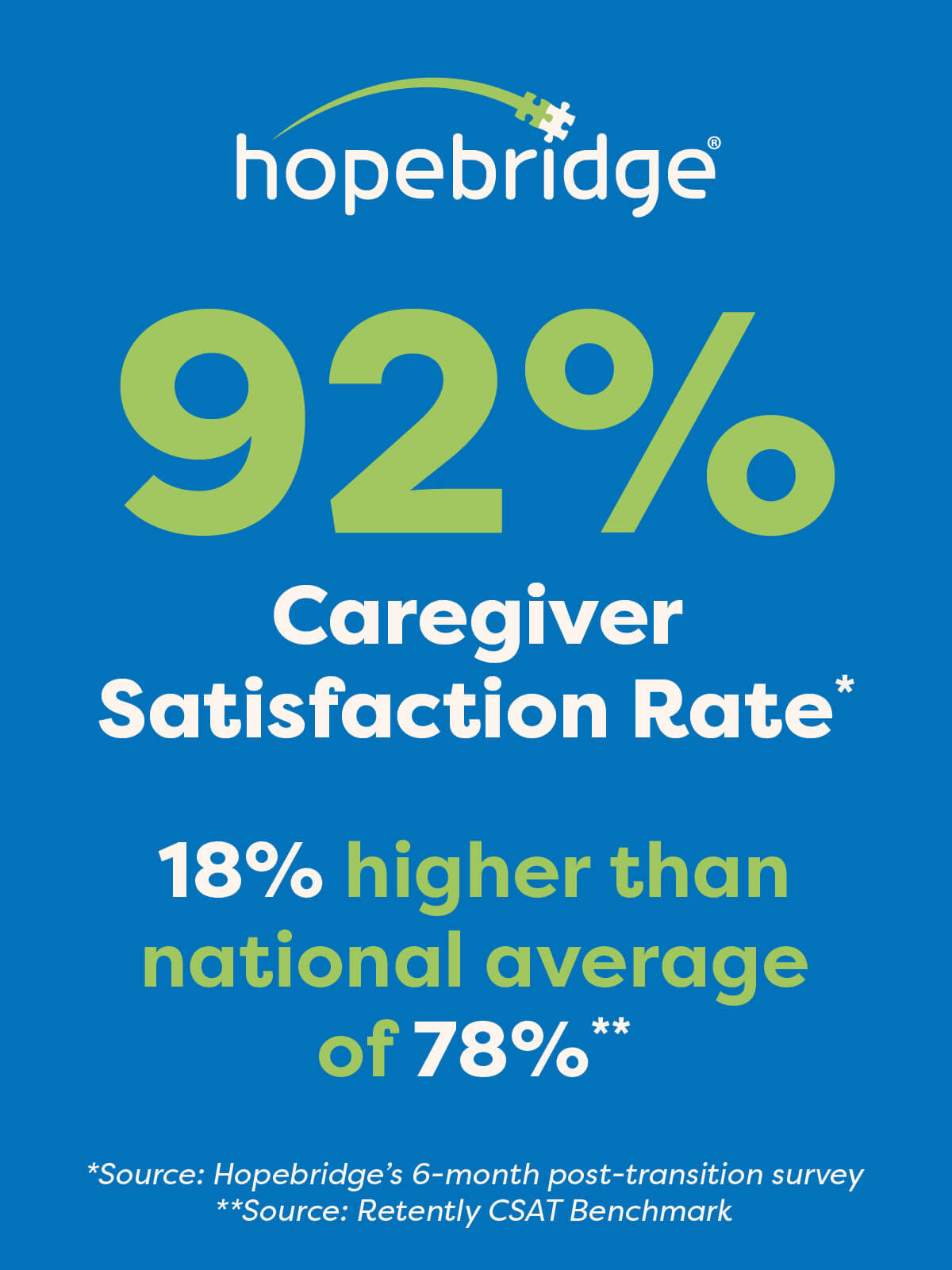
When our children graduate from Hopebridge and transition onto other life experiences, we keep up with our families. The continued success of our children and families is a part of why we do what we do.
Data from follow-up caregiver surveys indicate that after transitioning out of Hopebridge’s intensive therapy programs, our patients maintain progress and still attend school with minimal support3:
– 95% of caregivers stated their child is still attending school after receiving services Hopebridge
– 82% of caregivers stated their child maintained or continued to progress and acquire important developmental skills
– At the time of the survey, only 5% of caregivers reported their child required re-enrollment in intensive therapy services
From this research, we can glean that autistic children who participate in ABA therapy at Hopebridge are highly likely to succeed in classroom settings. If all autistic children had this level of support for the reduction of challenging behaviors (e.g. self-injurious behaviors), as well as the targeted programming concerning the acquisition of foundational, communication and social skills, we would anticipate more children to have the skills necessary to attend and progress in school.
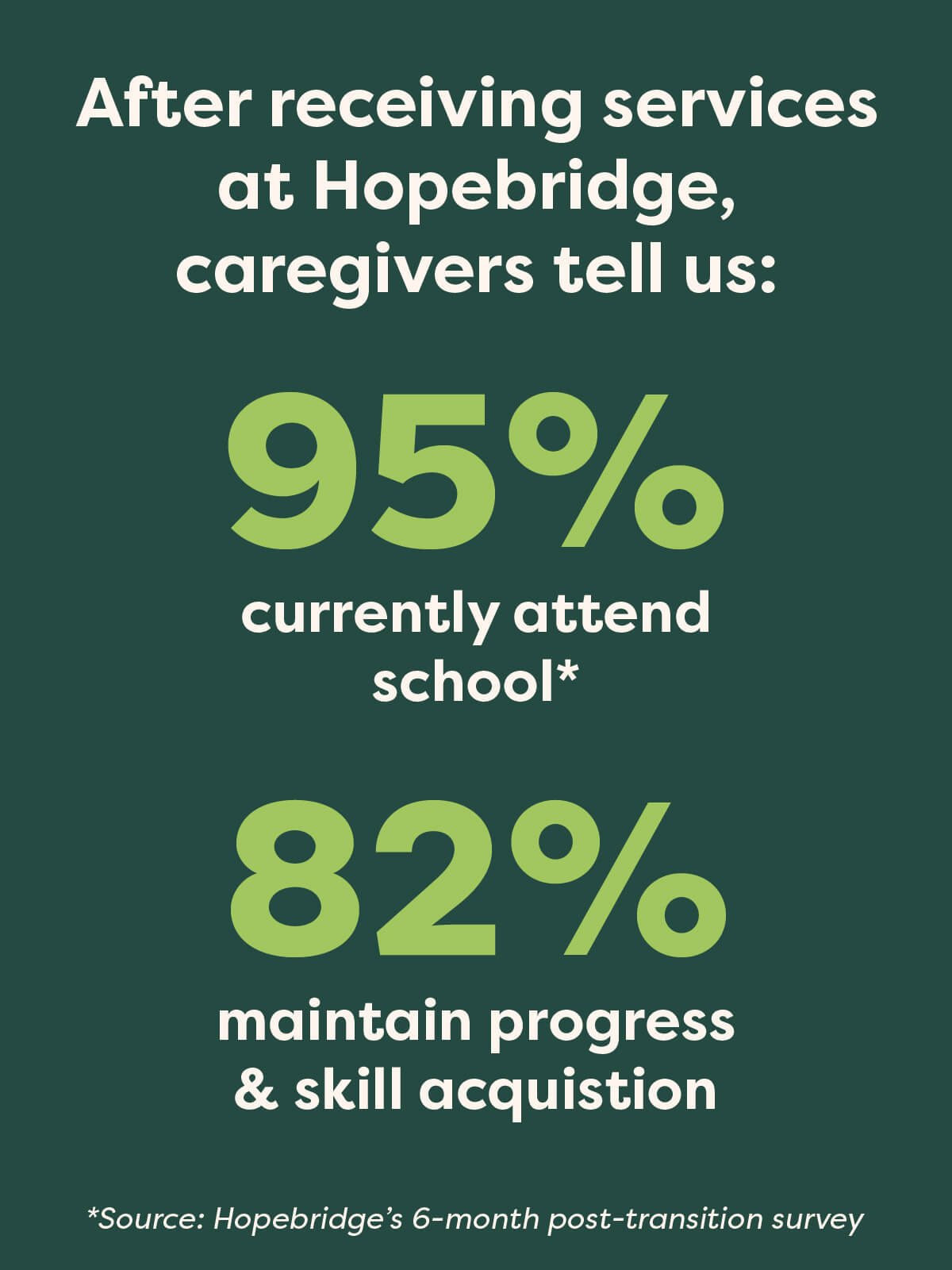
Clinical Leadership
Jana Sarno, BCBA | Chief Clinical Officer
Clinical Leadership
As Chief Clinical Officer for Hopebridge, Jana Sarno oversees all aspects of clinical training, service delivery and strategic planning for the multi-state, mission-driven organization. This includes directing many of Hopebridge’s clinical growth and development initiatives, such as BCBA Career Pathway competencies and grand rounds. Sarno leads Hopebridge’s clinicians through a breadth of continuing education opportunities on progressive, compassionate care topics such as neurodiversity-affirming care, trauma-informed care, HRE and cultural responsiveness. She also spearheads Hopebridge’s school-based ABA efforts, supporting schools through specialized training programs to empower educators. Now a Board Certified Behavior Analyst (BCBA) and doctoral candidate in school psychology, she earned her Bachelor of Science from Western Michigan University (WMU). Following graduation from WMU, Jana attended The University of Southern Mississippi, for her PhD. Sarno has extensive educational, clinical and professional development experience in the field of applied behavior analysis, including intensive clinical experience in the assessment and treatment of severe problem behavior, verbal behavior and feeding disorders. She has held clinical leadership positions at several in-home, school, and clinic-based ABA organizations. Along with her work at Hopebridge, Sarno volunteers on the Board of Directors for the Illinois Association for Behavior Analysis (ILABA). In her work with ILABA, she chairs the Legislative Affairs Committee that focuses on governmental relationships, grassroots advocacy, and increasing access to ABA through legislative change.
Clinical Advisory Board
Comprised of some of the foremost experts in the pediatric autism space, our Clinical Advisory Board provides oversight on existing clinical processes and procedures while also serving as a beacon for excellence as the science of ABA continues to evolve. Current priorities include dissemination of child and family outcomes, enhanced interdisciplinary collaboration, and expansion of a continuum of care for children to improve access to services.
As Hopebridge Chief Clinical Officer Jana Sarno puts it, “The Clinical Advisory Board is another important step in our pursuit of patient-focused, compassionate care. It adds to the checks and balances within our clinical systems to ensure that we are providing ethical and effective care. We are proud to organize and maintain a board of advisors from all different backgrounds and we trust their expertise and guidance.”
Clinical Tenure Impacts Continuity of Care
Data suggests continuity of care has implications on overall client and familial outcomes, making care team retention a key outcome we measure at Hopebridge. On average, the clinical tenure of our BCBAs and RBTs is 28.1 months, which is eight months longer than tenure for the average provider1.
At Hopebridge, we want to see this number continue to increase. We anticipate even longer retention in the future, given some of the clinical changes we have made, including:
- A BCBA Career Pathway that promotes ongoing skill acquisition and leadership opportunities
- The Bridge Program, a year-long mentorship and training program for BCBAs to expand their clinical repertoire while earning CEUs
- An unparalleled Fellowship Program where we home-grow our clinicians
BHCOE Accredited Organization
While we hold ourselves accountable to our own standards, it’s important that we also continue to evaluate our clinical practice and approach to ensure we’re evolving on an even larger level. As part of this, Hopebridge entered a rigorous clinical evaluation, which resulted in the Behavioral Health Centers of Excellence (BHCOE) recognition of our organization with a 2-Year Accreditation. After comprehensive interviews, a review of policies and procedures, formal site visits and surveys, Hopebridge is now a BHCOE Accredited Organization, showing the highest clinical quality and client care in applied behavior analysis (ABA therapy), and is currently in the process of renewal.
References:
1. National Autism Data Registry
2. Aylward BS, Gal-Szabo DE, Taraman S. Racial, Ethnic, and Sociodemographic Disparities in Diagnosis of Children with Autism Spectrum Disorder. J Dev Behav Pediatr. 2021 Oct-Nov 01;42(8):682-689. doi: 10.1097/DBP.0000000000000996. PMID: 34510108; PMCID: PMC8500365.
3. Hopebridge’s 6-month post-transition survey
4. Retently 2024 CSAT Benchmark
